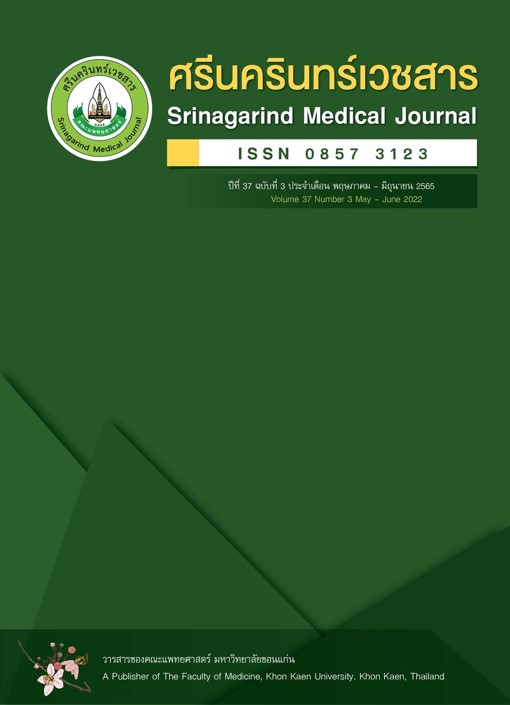Complications of Advanced Maternal Age Pregnancy: A Retrospective Cohort Study
Keywords:
advanced maternal age, complication, retrospective cohort study.Abstract
Objective: To study the percentage of advanced maternal age pregnancy (>35 years) and the pregnancy complications when compare with 20-34 years old group.
Materials and Methods: A retrospective cohort study in the women who delivered in Phen and UdonThani Hospitals during January 2019 to August 2021. The medical records were retrospectively reviewed, then the descriptive statistics, univariate and multiple logistic regression analysis were performed.
Results: The advanced maternal age pregnancy were 1,719 cases/ 9,330 total deliveries (18.42%). In this group, 57.01% had one or more complications. The most common were preterm delivery (15.30%) and gestational diabetes (13.03%). The risk of gestational diabetes, preeclampsia, and fetal macrosomia were increased in the advanced maternal age group when compared with 20-34 years old group with the adjusted Odds ratio 2.91 (95%CI 2.35-3.58), 1.33 (95%CI 1.08-1.64) and 1.51 (95% CI 1.08-2.10), respectively.
Conclusion: The prevalence of advanced maternal age was 18.42% of total deliveries. The risk of gestational diabetes, preeclampsia, and fetal macrosomia were increased in this group. Therefore, these complications should be aware in this maternal age group.
References
National Center for Health Statistics Data Brief No.232. Mean age of mothers is on the rise: United States, 2000-2014. Available at http://www.cdc.gov/nchs/data/databriefs/db232.pdf.
United Nation Economic Comission for Europe. Trends in Europe and North America: the statisticl yearbook of the Economic Comission for Europe 2005. Geneva: The Commission; 2005. Available at www.unece.org/stats/trends2.
Reproductive Health Working Group. Alberta reproductive health: pregnancies and births 2006; 2006. Available at www.health.gov.ab.ca/resources/pubnlications/reroductive06.pdf.
Salihu HM, Shumpert MN, Slay M, Kirby RS, Alexander GR. Childbearing beyond maternal age 50 and fetal outcomes in the United States. Obstet Gynecol 2003;102:1006-14.
Simchen MJ, Yinon Y, Moran O, Schiff E, Sivan E. Pregnancy outcome after age 50. Obstet Gynecol 2006;108:1084-8.
Sauer MV, Paulson RJ, Lobo RA. Pregnancy in women 50 or more years of age: outcomes of 22 consecutively established pregnancies from oocyte donation. Fertil Steril 1995;64:111-5.
Dildy GA, Jackson GM, Fowers GK, Oshiro BT, Varner MW, Clark SL. Very advanced maternal age: pregnancy after age 45. AJOG 1996;175:668-74.
Lisonkova S, Potts J, Muraca GM, Razaz N, Sabr Y, Chan WS, et al. Maternal age and severe maternal morbidity: A population-based retrospective cohort study. PLoS med 2017;14:e1002307.
Bayrampour H, Heaman M. Advanced maternal age and the risk of cesarean birth: a systematic review. Birth 2010;37:219-26.
Ngamjarus C. Sample Size Calculation for an Epidermiological Study on a Smart Device. . Siriraj Med J 2016;68:160-70.
Sheen JJ, Wright JD, Goffman D, Kern-Goldberger AR, Booker W, Siddiq Z, et al. Maternal age and risk for adverse outcomes. AJOG 2018;219:390 e1- e15.
ชัยรัตน์ คุณาวิกติกุล, สุกัญญา ยะนันโต. ผลของการตั้งครรภ์ของมารดาอายุมาก. เชียงใหม่เวชสาร 2543;39:77-83.
พิมลพรรณ อิศรภักดี, ฐิตินันท์ ผิวนิล. คุณภาพการตั้งครรภ์ของหญิงไทยวัยเจริญพันธุ์ช่วง พ.ศ.2541-2558 (Quality of Pregnancy Outcomes among Thai Women of Reproductive Age during 1998-2015). In: สุชาดา ทวีสิทธิ์, กุลภา วจนสาระ (บรรณาธิการ).ประชากรและสังคม, 2560. Available from: http://www.ms.ipsr.mahidol.ac.th/Conference2017/Download/Book/05_Pimolpan-Quality%20of%20pregnancy.pdf.
Ventura SJ, Hamilton BE. Birth Rates Among Women Aged 15-44 Years, by Maternal Age Group-National Vital Statistics System, United States, 1961, 2007, and 2011. MMWR Morb Mortal Wkly Rep. 2012;61.
Martin JA, Hamilton BE, Ventura SJ, Osterman MJ, Mathews TJ. Births: final data for 2011. National vital statistics reports : from the Centers for Disease Control and Prevention, National Center for Health Statistics, Natl Vital Stat Rep 2013;62:1.
Cleary-Goldman J, Malone FD, Vidaver J, Ball RH, Nyberg DA, Comstock CH, et al. Impact of maternal age on obstetric outcome. Obstet Gynecol 2005;105:983-90.
วิจิตร เอกัคคตาจิต. ภาวะแทรกซ้อนในหญิงตั้งครรภ์อายุมากที่มารับบริการในโรงพยาบาลนางรอง. วารสารโรงพยาบาลมหาสารคาม 2559;13:71-7.
Gilbert WM, Nesbitt TS, Danielsen B. Childbearing beyond age 40: pregnancy outcome in 24,032 cases. Obstet Gynecol 1999;93:9-14.
Paulson RJ, Boostanfar R, Saadat P, Mor E, Tourgeman DE, Slater CC, et al. Pregnancy in the sixth decade of life: obstetric outcomes in women of advanced reproductive age. JAMA 2002;288:2320-3.
Yogev Y, Melamed N, Bardin R, Tenenbaum-Gavish K, Ben-Shitrit G, Ben-Haroush A. Pregnancy outcome at extremely advanced maternal age. AJOG 2010;203(6):558 e1-7.
Hassold T, Chiu D. Maternal age-specific rates of numerical chromosome abnormalities with special reference to trisomy. Hum Genet 1985;70:11-7.
Nybo Andersen AM, Wohlfahrt J, Christens P, Olsen J, Melbye M. Maternal age and fetal loss: population based register linkage study. BMJ 2000;320:1708-12.
Downloads
Published
How to Cite
Issue
Section
License
Copyright (c) 2022 Srinagarind Medical Journal

This work is licensed under a Creative Commons Attribution-NonCommercial-NoDerivatives 4.0 International License.




